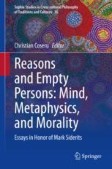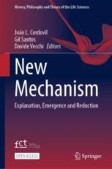Search
Search Results
-
Does Panpsychism Explain Mental Causation?
In the contemporary literature on panpsychism, one often finds the claim that a Russellian-monist version of panpsychism, i.e., Russellian panpsychism ...
-
Mental causation, interventionism, and probabilistic supervenience
Mental causation is notoriously threatened by the causal exclusion argument. A prominent strategy to save mental causation from causal exclusion...
-
On the probabilistic character of irreducible mental causation
It has recently been remarked that the argument for physicalism from the causal closure of the physical is incomplete. It is only effective against...

-
The Timing Problem for Dualist Accounts of Mental Causation
Setting aside all exclusion-style worries about the redundancy of postulating additional, non-physical mental causes for effects that can already be...

-
Functionalism, interventionism, and higher-order causation
It has been argued that nonreductive physicalism’s problems with mental causation disappear if we abandon the intuitive but naïve production-based...

-
Emergent agent causation
In this paper I argue that many scholars involved in the contemporary free will debates have underappreciated the philosophical appeal of agent...
-
Causal pluralism: agent causation without the panicky metaphysics
An important divide in the free will literature—one that is arguably almost as common as the distinction between compatibilism and...
-
A Process-Oriented Approach to Mental Causation
Friedrich Sieben argues that a process-oriented approach in the tradition of Whitehead is more adequate for understanding the phenomenon of mental...
-
How to unify grounding and causation
The unification of grounding and causation has been proposed in the literature. Also, it has encountered many objections. In this paper, I argue that...

-
Does causation entail emptiness? On a point of dispute between Abhidharma and Madhyamaka
The aim of this paper is to assess the relation between causation and the notion of emptiness described in Buddhist philosophy. While the Madhyamaka...
-
The Ontology of Causation: A Carnapian-Pragmatist Approach
Metaphysicians of causation have long debated the existence of primitive causal modalities (e.g., powers), with reductionists and realists taking...
-
Emergent mental properties are not just double-preventers
We examine Sophie Gibb’s emergent property-dualist theory of mental causation as double-prevention. Her account builds on a commitment to a version...

-
On Necessary Connection in Mental Causation––Nāgārjuna’s Master Argument Against the Sautrāntika-Vasubandhu: A Mādhyamika Response to Mark Siderits
The two traditional Indian Buddhist philosophers – the Mādhyamika Nāgārjuna (c.150–250) and the Sautrāntika-Vasubandhu (c. 350–430) – agree that...
-
Super-Humeanism and Mental Causation
The stance that has become known as Super-Humeanism is a minimal ontology of the natural world in the spirit of scientific realism. The paper...
-
Emergence, Downward Causation, and Interlevel Integrative Explanations
In this article, I propose a unified account of systemic emergence, downward causation, and interlevel integrative explanations. First, I argue for a...
-
Hamilton, Hamiltonian Mechanics, and Causation
I show how Sir William Rowan Hamilton’s philosophical commitments led him to a causal interpretation of classical mechanics. I argue that Hamilton’s...

-
Consequences of the Idealist Interpretation for Causation
In this chapter, I discuss the second metaphysical implication of the Idealist reading, pertaining to causation. Spatial contiguity seems to be one...
-
Building low level causation out of high level causation
I argue that high level causal relationships are often more fundamental than low level causal relationships. My argument is based on some general...

-
Mental Causation—Problems and Buddhist Response
When one says, “I had a desire to have a glass of water and this was followed by my action to fetch the glass of water” then the common sense...
-
Downward Causation in Self-Organizing Systems: Problem of Self-Causation
Enabling constraints are bottom up causes which create the possibility of the existence of a system. Disabling constraints reduce the degrees of...
